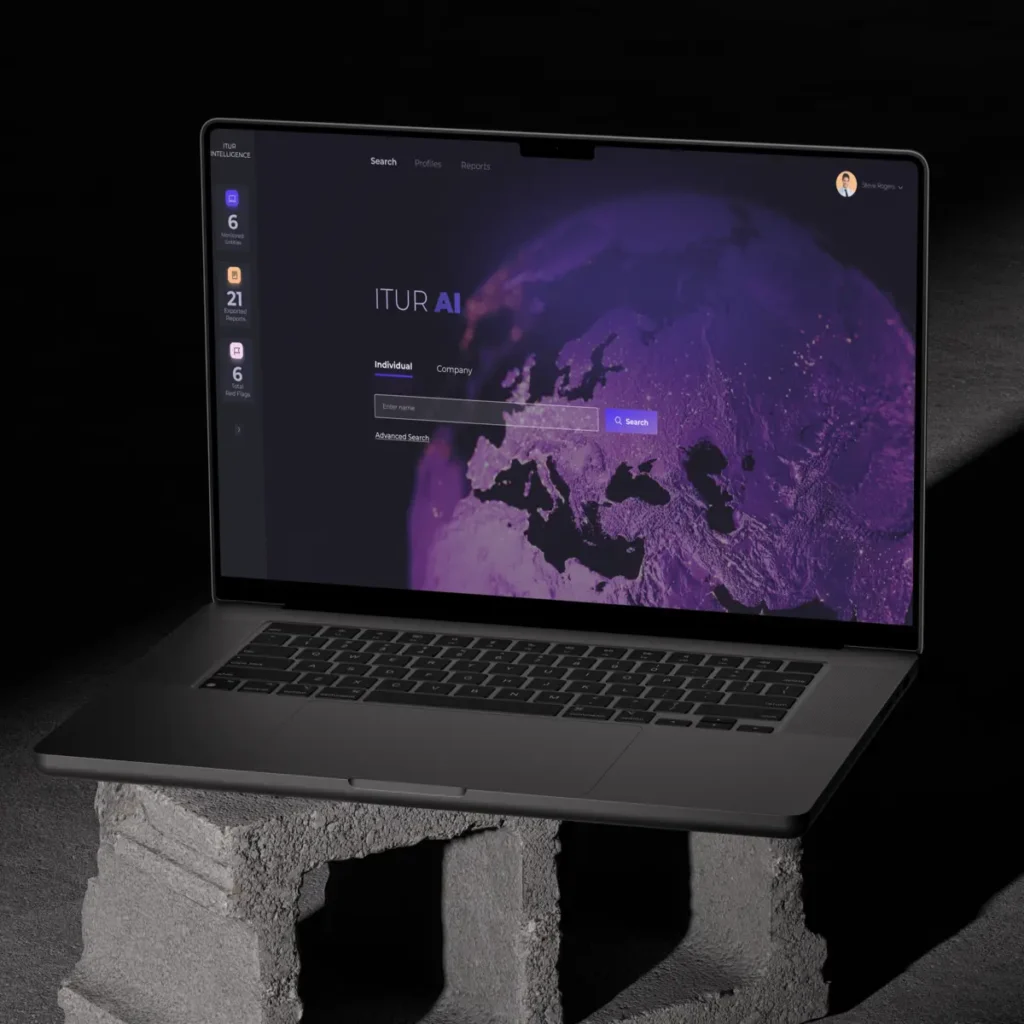WHY ITUR
WHY ITUR
- Global coverage
- All-in-one platform.
- Convenient and user-friendly interface.
- Aliases and Digital Footprints exposure with correlation.
- Customized and automated enhanced accurate reporting
- Patent pending technology for highest accuracy and entity realization.
- Proactively data scrape from Open Source and hidden Dark Web sources.
KYC, or Know Your Customer, is a process utilized by financial institutions and other regulated entities to confirm the identity and assess the risks associated with a business relationship. This involves gathering and evaluating personal details, such as identification documents and financial information, to comply with legal standards and prevent illicit activities like money laundering and fraud. Through KYC checks, institutions aim to understand their customers better and ensure the integrity of financial transactions.
Offering detailed insights into their financial activities and potential risk factors, facilitating the detection and prevention of illicit money flows. This intelligence, sourced from diverse channels, helps organizations monitor and analyze transactions more effectively, ensuring compliance with AML regulations and mitigating the risk of money laundering activities. By leveraging this information, AML teams can better identify suspicious behaviors, tailor their investigative approaches, and uphold the financial system's integrity in an ever-evolving regulatory landscape.
KYB, or Know Your Business, is a process employed by financial institutions and other regulated entities to verify the identity and assess the risks of a business client. This involves collecting and analyzing information about the business, such as registration documents, ownership structure, and financial records, to comply with regulatory requirements and mitigate risks like fraud and money laundering. By conducting KYB checks, institutions aim to gain a comprehensive understanding of the business and ensure the legitimacy of their commercial relationships.
Providing comprehensive insights into their backgrounds, reputations, and potential risks, thereby facilitating informed decision-making and risk management. This intelligence, sourced from various channels, assists organizations in verifying the authenticity of their customers or partners, ensuring compliance with regulatory requirements, and mitigating the risk of fraud or illicit activities from the outset. By leveraging this information during onboarding, organizations can streamline their processes, enhance due diligence efforts, and establish trusted relationships with stakeholders, fostering long-term success in a dynamic business environment.
Identifying, evaluating, and prioritizing potential risks that could impact an organization or project. This involves analyzing various factors, such as financial, operational, legal, and environmental risks, to determine their likelihood and potential impact. By systematically assessing risks, organizations can develop strategies to mitigate or manage these risks, ensuring better decision-making and safeguarding against unforeseen events. Risk assessment helps organizations proactively address vulnerabilities and enhance their resilience.
Enhance the compliance process by providing deeper insights into their backgrounds, behaviors, and potential risks, thereby enabling more informed decision-making and risk management. This intelligence, gathered from various sources, helps organizations assess the legitimacy and reliability of their partners and clients, ensuring adherence to regulatory standards and reducing the likelihood of illicit activities. With comprehensive information, compliance teams can better tailor their strategies, anticipate challenges, and maintain the integrity of their operations while navigating complex regulatory environments.
Process made thorough investigation and analysis conducted by a company or individual to assess the viability, risks, and opportunities associated with a potential business transaction or investment. This process involves gathering and evaluating detailed information, such as financial records, legal documents, and operational data, to ensure informed decision-making and compliance with regulatory standards. Through due diligence, parties aim to identify any potential issues, validate the accuracy of information, and ultimately protect their interests in the transaction.
EXAMPLES FOR USECASES
- Due Diligence
An international bank used our platform for due diligence on a potential acquisition. The analysis revealed understated liabilities and undisclosed lawsuits, while analyzing personal information and revealed more liabilities on family members.
- Risk Analysis
A multinational corporation used our platform for risk assessment before entering a new market. It revealed high corruption and economic instability, leading the corporation to delay entry and seek safer alternatives.
- Compliance
A global financial services company used our platform for compliance with international regulations. Real-time updates on regulatory changes allowed them to address compliance gaps promptly, avoiding fines and maintaining operational integrity.
- Sanctions Assessments
A global trade company utilized our platform for sanctions assessments. The platform automated the screening of clients against international sanctions lists, uncovering hidden affiliations and flagged entities.
- KYC
A major financial institution used our platform to onboard a new client. During the KYC process, our platform revealed inconsistencies between the client’s provided information and their online presence. Further investigation uncovered past fraudulent activities.
- Onboarding
A tech comapny used our platform to streamline client onboarding. It automated identity verification, reducing time and effort, and flagged potential risks. Facial recognition uncovered hidden social media profiles, ensuring thorough due diligence and swift onboarding.

